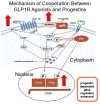Enhancing Progestin Therapy with a Glucagon-Like Peptide 1 Agonist for the Conservative Management of Endometrial Cancer
- PMID: 40002193
- PMCID: PMC11853405
- DOI: 10.3390/cancers17040598
Enhancing Progestin Therapy with a Glucagon-Like Peptide 1 Agonist for the Conservative Management of Endometrial Cancer
Abstract
Objective: Obesity is a major risk factor for endometrial cancer. In addition to hormone therapy with progestins, glucagon like peptide-1 receptor (GLP-1R) agonists such as semaglutide may be helpful to achieve weight loss during conservative treatment of endometrial hyperplasia or cancer.
Methods: We theorized that the combination of semaglutide and the progestin levonorgestrel would be useful as a novel treatment or prevention regimen and tested this hypothesis using endometrial cancer cell lines and patient-derived organoids (PDOs).
Results: Hec50, KLE, and Ishikawa endometrial cancer cells express GLP-1R, as determined by both qPCR and Western blotting, and GLP-1R agonist treatment induces GLP-1R mRNA transcription through positive feedback mechanisms in cell models. PDOs from six individuals with grade 1 endometrial carcinomas were treated with progesterone, levonorgestrel, semaglutide, or levonorgestrel + semaglutide. Multiple models demonstrated a significant reduction in viability in response to combinatorial treatment, and the effect was noted in models from both PR high- and PR low-expressing tumors. Most interesting was the induction not only of the membrane GLP-1R with treatment, but also the significant upregulation of nuclear and membrane progesterone receptors-PR and PGRMC1/2, respectively-indicating a potential positive feedback loop between semaglutide and progestins such as levonorgestrel.
Conclusion: In summary, we identify synergistic molecular cross-talk between the GLP-1R and steroid hormone receptor pathways, with the potential to enhance the anticancer activity of levonorgestrel when combined with semaglutide.
Keywords: conservative management; endometrial cancer; glucagon-like peptide 1 receptor agonists; hormone therapy; progesterone.
Conflict of interest statement
The authors declare no conflicts of interest.
Figures





References
Grants and funding
- P30 CA118100/CA/NCI NIH HHS/United States
- NIH 2R01CA 99908-16A1, "Targeted Therapy for Endometrial Cancer", 2/15/2019-6/31/2024, K. Leslie, PI. OC190352 "Converting Mutant p53 into an Actionable Target for the Treatment of Ovarian Cancer", Department of Defense (DoD), 2020-09/30/2024, K. Leslie,/NIH and the Department of Defense Congressionally Directed Medical Research Program
- P30 CA086862/CA/NCI NIH HHS/United States
- K22 CA263783/CA/NCI NIH HHS/United States
- R01 CA099908/CA/NCI NIH HHS/United States
LinkOut - more resources
Full Text Sources
Research Materials

